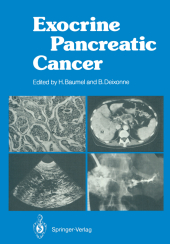 Neuerscheinungen 2012Stand: 2020-01-07 |
Schnellsuche
ISBN/Stichwort/Autor
|
Herderstraße 10
10625 Berlin
Tel.: 030 315 714 16
Fax 030 315 714 14
info@buchspektrum.de |

Hughes Baumel, Bernard Deixonne, H. Sarles
(Beteiligte)
Exocrine Pancreatic Cancer
Mitarbeit: Sarles, H.; Herausgegeben von Baumel, Hughes; Deixonne, Bernard
Softcover reprint of the original 1st ed. 1986. 2012. xvi, 214 S. 36 Tabellen. 244 mm
Verlag/Jahr: SPRINGER, BERLIN 2012
ISBN: 3-642-71180-4 (3642711804)
Neue ISBN: 978-3-642-71180-0 (9783642711800)
Preis und Lieferzeit: Bitte klicken
For a long time, approximately since Oberlin and Guerin described the multifocal origin of pancreatic cancers and precancerous pancreatic lesions, no important study dealing with the entire subject of pancreatic cancer has been published in France and probably in the international literature. For some decades the knowl edge acquired 40years or more ago was not improved appreciably, though the fre quency ofthe disease started to increase in occidental countries. This has recently changed, and the progress ofthe medical sciences has spread to the pancreas. Although the surgical or medical prognosis of the most frequent form of pancreatic cancer, exocrine adenocarcinoma, remains very bad, recent studies have shown the multiplicityofits pathological forms, some being less severe so that curative surgery is possible. New experimental models, particularly in the hamster, and the use of carcinogenic drugs allow experimental studies on lesions similar to those in man. Oncologic immunology is still at its beginnings but shows promise for diagnosis and treatment. Though modem techniques of imaging sonography, aspirative cytology, CT scan, endoscopic catheterism, arteriography, and maybe in the future nuclear magnetic resonance - have not yet significantly in fluenced prognosis,they have made the diagnosis easierand more precocious. Yet in a diseasethat diffuses so rapidly to deep lymph nodes, it has not been proved whether early diagnosis can improve prognosis.


